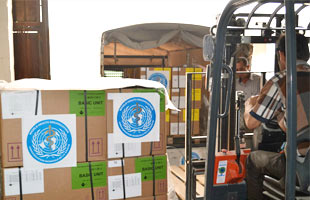 WHO is providing inter-agency health kits containing medicines and medical supplies for 200 000 people as part of its response to the ongoing crisis in Iraq. Photo credit: Saad Al-Dahwi/WHOErbil, 16 June, 2014 – WHO is working with local and international partners in Iraq to meet the urgent health needs of populations affected by the ongoing crisis.
WHO is providing inter-agency health kits containing medicines and medical supplies for 200 000 people as part of its response to the ongoing crisis in Iraq. Photo credit: Saad Al-Dahwi/WHOErbil, 16 June, 2014 – WHO is working with local and international partners in Iraq to meet the urgent health needs of populations affected by the ongoing crisis.
The humanitarian situation in Iraq has deteriorated dramatically in the last few days, especially in the regions of Ninewa, Salaheddin and Diyala provinces. More than 500 000 people are estimated to have fled their homes in Mosul and surrounding areas. An estimated 100 000 have entered Erbil and 200 000 have fled to Dohuk. Almost 25 000 are seeking shelter in schools and mosques in Mosul City, many with no access to drinking- water, as the main water station for the area was destroyed by bombing, and food shortages are being reported. As the fighting continues, hundreds of thousands more are stranded at checkpoints with no belongings or money for housing, food, water or medical care. Accurate figures of casualties are unavailable but stand in the hundreds.
WHO is concerned about the health situation, which is expected to deteriorate given increasing numbers of people requiring humanitarian assistance and the difficulties faced in channelling human resources and logistics from Baghdad to affected areas.
Immediate and critical health risks of concern to WHO include the spread of measles, which is endemic in Mosul and could potentially lead to outbreaks, especially in overcrowded areas where internally-displaced persons are located. The spread of polio is also a high risk as new cases were reported in the country earlier this year as a result of the Syria crisis.
To monitor disease outbreaks, WHO has strengthened its disease early warning alert and response system in Kurdistan and Mosul. WHO is also launching emergency polio and measles vaccination activities for internally-displaced persons with the directorates of health in Dohuk and Erbil.
As water and sanitation services are likely to be interrupted as a result of the crisis, there is an increased risk of waterborne diseases, such as acute watery diarrhoea, especially as temperatures rise during the coming summer months. A team from WHO is currently on the ground assessing the risk of epidemics in affected areas and will ensure that systems are in place to rapidly respond and contain disease outbreaks.
According to an initial rapid assessment of health facilities in Mosul, three of the city’s seven hospitals are partially functional due to lack of human resources and funding, while the remainder, including a pediatric hospital and a surgical hospital, are fully functional. Out of 40 primary health clinics in Mosul City, 37 are fully functional with staff, medicines, and water and electricity supplies. As the crisis continues, however, access to health facilities for populations in Mosul may be a challenge. WHO has deployed a public health expert to Mosul to work with health partners in assessing health gaps and needs for affected populations.
To ensure adequate trauma care for patients, WHO is supporting the directorate of health in Dohuk with provision of medical supplies for mobile clinics and has also provided interagency emergency health kits containing medicines and medical supplies for 20 000 people for three months, as well as trauma kits for the treatment of 200 people and diarrhoeal disease kits for the treatment of 200 people with severe diarrhoeal disease or 400 people with moderate diarrhoeal disease.
“The impact of the unfolding armed conflict in Mosul and neighbouring districts on the health of affected population cannot be underestimated. These developments are expected to result in critical health consequences,” said WHO Representative in Iraq Dr Syed Jaffar Hussain. “The response to the health needs of those affected by the crisis requires concerted actions from all partners."
WHO’s response to the crisis will focus on: coordination among health actors, including local health authorities, the Iraqi Red Crescent Society and nongovernmental organizations; trauma care (including mental health); outbreak control, protection of hospitals and health personnel; ensuring the continuation of the supply chain for medicines and medical supplies; gap-filling in water, sanitation and hygiene activities, maternal and child health activities and key public health functions.
For more information, contact:
Iliana Mourad, Emergency Health Cluster Coordinator at
Inas Hamam, WHO Communications Officer at


